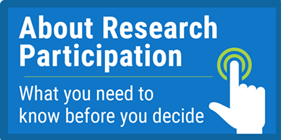Participating in Clinical Research
 During the research process, you may get better, you may stay the same, or you may even get worse. As health care professionals, we will always give you excellent medical care. As researchers, we must also follow a research plan very carefully. We will tell you everything that we know about the benefits and risks of the research study before you volunteer.
During the research process, you may get better, you may stay the same, or you may even get worse. As health care professionals, we will always give you excellent medical care. As researchers, we must also follow a research plan very carefully. We will tell you everything that we know about the benefits and risks of the research study before you volunteer.
To help you decide, someone in the research team will explain details of the study to you. We will give you an informed consent document that describes important facts about the study. We encourage you to consider the informed consent thoughtfully. You may want to discuss it with family and friends, with another doctor, or with other people you trust. Before you sign the informed consent form to join a study, you should take as much time as you want to think about your decision. Ask us questions if there is anything you don’t understand. You have the right to choose whether or not to volunteer- no one else should make that choice for you. You have the right to understand what the research is before you agree to take part. You have the right to change your mind at any time. You may leave the study for any reason.
Some questions to ask before joining a clinical trial or research study
- What is the purpose of this study, and what questions will it answer?
- What procedures and tests will be done?
- What are the expected benefits of the treatment or procedure?
- What are the expected risks, harms or inconveniences?
- How long will the study last?
- How often will I need to come to the clinic?
- What kind of support from my family and friends will I need?
- Who will pay for my medical care while I am taking part in this study?
- What will happen if my condition gets worse or I am injured?
- What will happen if I decide to leave the study early?
- What will happen if the researchers decide to end the study early?
- Will I still be able to continue my regular treatments or therapies while participating in the study?
- How will my personal and medical information be used/shared, stored, and protected?
- Will I have access to any study results?
- How will my health be monitored during the study?
- What is expected of me?
How are research participants protected?
Medical research has built into it many layers of protection for you as a research volunteer. We must ask you or your legal representative if you agree before we put you in a research study. Doctors and nurses have a code of ethics they follow while taking care of you. Medical researchers must also follow codes of ethics for medical research involving humans. There are rules that have been developed over the decades to protect the rights of research participants.
The University’s Institutional Review Board (IRB) protects your safety and rights before and while you take part in a study. The Food and Drug Administration (FDA) and the U.S. Department of Health and Human Services also have laws that regulate how we protect volunteers in research.
UTHealth Houston
The Office of Research Support Committees
Committee For The Protection of Human Subjects
Phone: (713) 500-7943
Fax: (713) 500-0319
uth.edu/CPHS